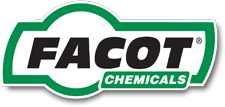PREMISE
This summary has been drawn up to the best of our current knowledge and does NOT have any pretentions to substituting for neither Laws and Standards on the matter, nor for the installers and heating engineers’ expertise; on the contrary it intends to be of help to find solutions to problems and to prevent them by assisting you in choosing the most suitable product among Facot Chemical’s range, the result of 50 years’ experience, which is currently amongst the widest and most complete range in the sector at international level.
FOREWORD
During the last years the treatment of heating systems has become of primary importance most of all with regard to the costs of one of the most important investments made in our house and to the enormous consumption of energy dissipated due to bad functioning of old or badly maintained systems. This phenomenon is even more important if we consider that emissions to the atmosphere are strictly connected to both the quantity of exhaust emissions resulting from the decreased efficiency of a system due to wear and tear and to the lack of cleaning and to the quality of emissions themselves which, in the worst cases of bad maintenance, can become real poisons.
We will not dwell on the pollution subject (which is exhaustively covered in the different international protocols) but we will confine ourselves to quoting the European Community Standards (hereunder listed and to which each country adapts through Decrees and National Laws) which have the common aim to limit consumptions and divulge the culture of correct maintenance with a view to energy saving. Hereunder is a non-exhaustive list of the main types of
SYSTEMS
HEATING SYSTEM
(closed circuit or make-up system). There are several systems ranging from the most classical central heating systems providing the use of a boiler and radiators, to the most modern radiant floor heating systems using high-efficiency condensing boilers, to natural or forced circulation solar heating systems.STEAM GENERATING INSTALLATIONS
(open systems), generally industrial plants.COOLING PLANTS
(generally closed circuit ones) with air/water systems (fan-coils), industrial exchangers or floor cooling systems.DOMESTIC HOT WATER
(open circuit), with or without accumulation.BITHERMAL SYSTEMS
for domestic hot water and heating systems.In the first three cases the main problems are corrosion due to different phenomena, the formation of sludge and the formation of weed and bacteria. In the fourth case the main problem consists in the formation of limescale and of corrosion oxides. The last case (among the most common) is a combination of the problems above mentioned. Another problem is represented by purity and organoleptic properties of water (taste and odour)

